Contents
ChemiCloud Vs Bluehost Introduction
ChemiCloud has been around for more than 10 years globally and is a fast, secure, and reliable cloud hosting platform. The platform offers customers a brilliant hosting experience and has hosting solutions for all types of users.
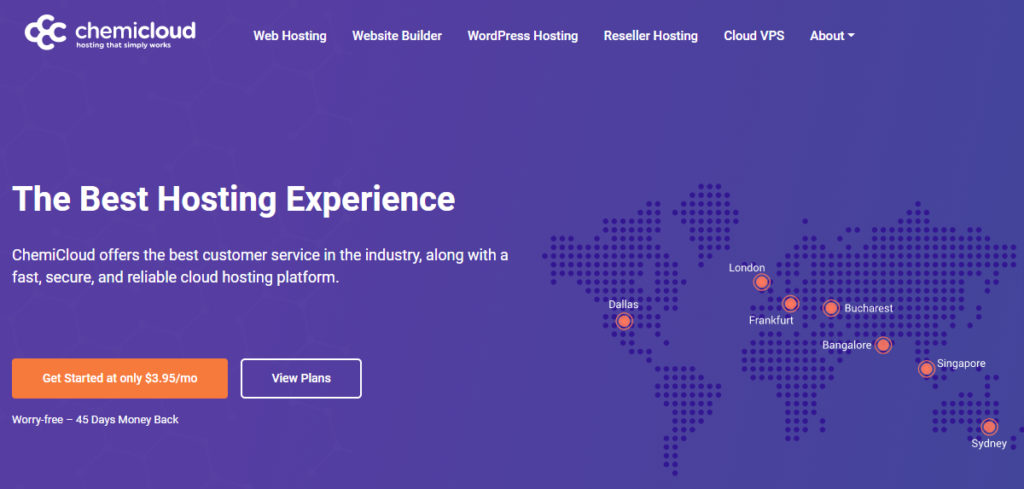
Bluehost was established in 2003 and is an extremely popular hosting platform that helps you build websites effortlessly. Over the years, the hosting service has catered to all types of customers, and the service also comes with good support.

This post will explain various crucial aspects of the two services, including pricing, performance, and features. Reading this post till the end, you will have a very clear picture of the two services and how they work, which will eventually help you easily choose between the two.
ChemiCloud Vs. Bluehost: Pricing
ChemiCloud comes with 3 different shared plans based on the number of websites, SSD Disk Space, Support, and Price. The service allows customers to start for as low as $3.95 per month. You can also use our exclusive ChemiCloud Coupon Code to get 60% OFF on the top of official pricing. Here are the plan details:
- Web Hosting Starter: $3.95 per month, 1 Website, 15 GB SSD Disk Space, basic support
- Web Hosting Pro: $6.95 per month, Unlimited Websites, 25 GB SSD Disk Space, and Priority Support
- Web Hosting Turbo:$10.95 per month, Unlimited Websites, 35 GB SSD Disk Space, and Priority Support
The following features are available in all the plans:
- Unlimited Bandwidth
- Free Domain for life
- Unlimited Email accounts
- Free Let’s Encrypt SSL
- Free Migrations
- Worldwide Server Locations
- Free Daily Backups
- 45-Day Money-Back Guarantee
Bluehost has 4 different shared plans based on the number of websites and the size of the SSD Storage. Here are the plan details:
- Basic: $3.95 per month, 1 Website, 50 GB SSD Storage
- Plus: $5.95 per month, Unlimited Websites, Unlimited SSD Storage
- Choice Plus; $6.95 per month, Unlimited Websites, Unlimited SSD Storage
- Pro: $13.95 per month, Unlimited Websites, Unlimited SSD Storage, Optimized CPU Resources
Some features available in all plans are:
- Custom Themes
- 24/7 Customer Support
- Free Domain for 1 year
- Free CDN
- Free SSL Certificate
ChemiCloud Vs. Bluehost: Performance
Server Response Time
Performance is the most crucial factor in choosing a hosting service, and you must ensure that the hosting platform you choose comes with the best performance. However, it may not be as simple as it seems since evaluating the performance of a hosting service takes more than just testing the speed and uptime.
There are factors such as Global TTFB, Load handling, and Core Web Vitals that need to be well tested as well before you choose a service. Of course, testing the speed and uptime is very important, and I will start with the server response time or speed first.
I hosted a site on the ChemiCloud platform and a site on the Bluehost platform for testing purposes. I have been monitoring the performance of the two sites since the time I have set them up.
According to my last test, my ChemiCloud site recorded an average server response time of 347 ms, while my Bluehost site recorded an average server response time of 460 ms. Hence, you can see ChemiCloud has a better server response time than Bluehost.
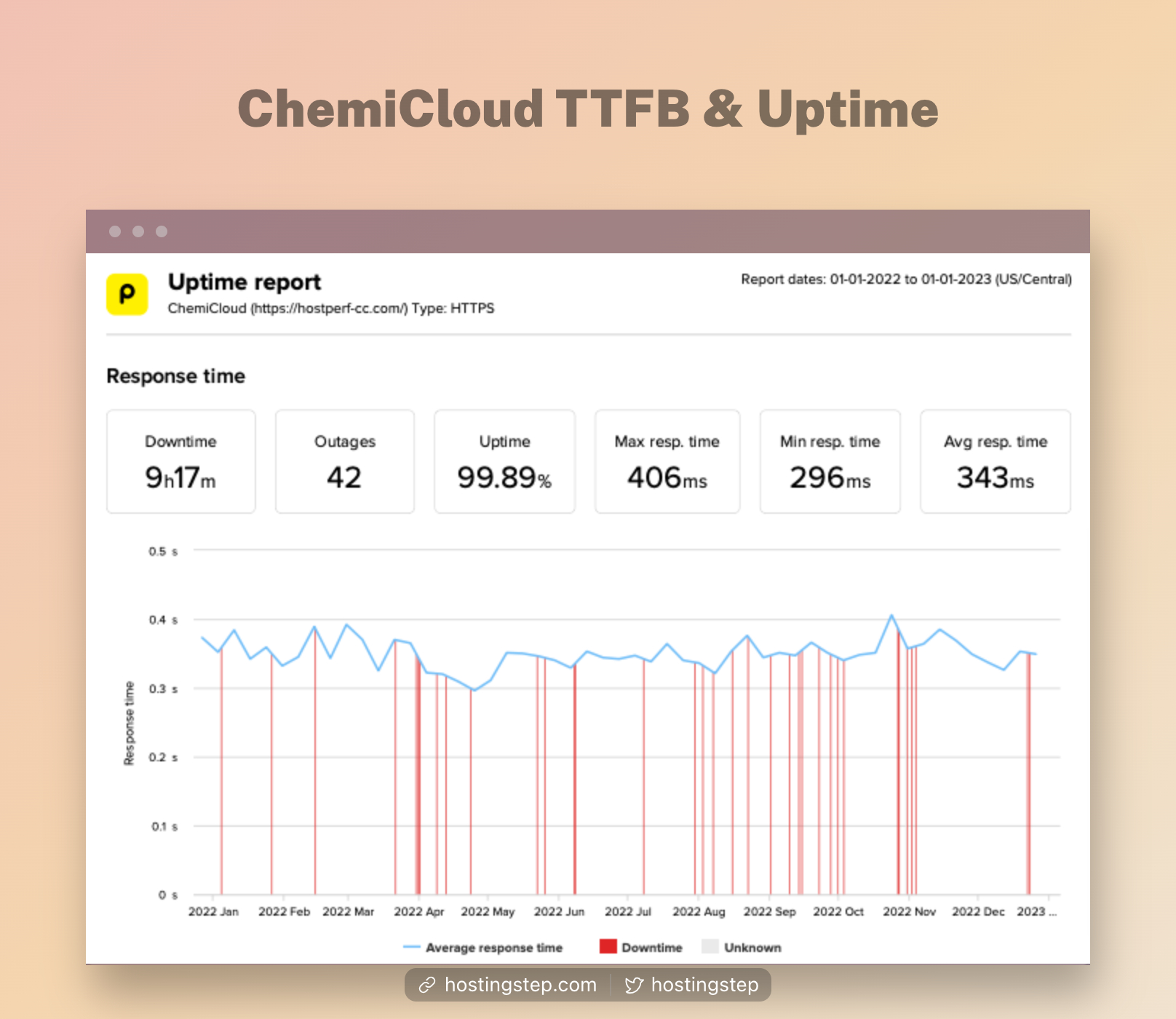
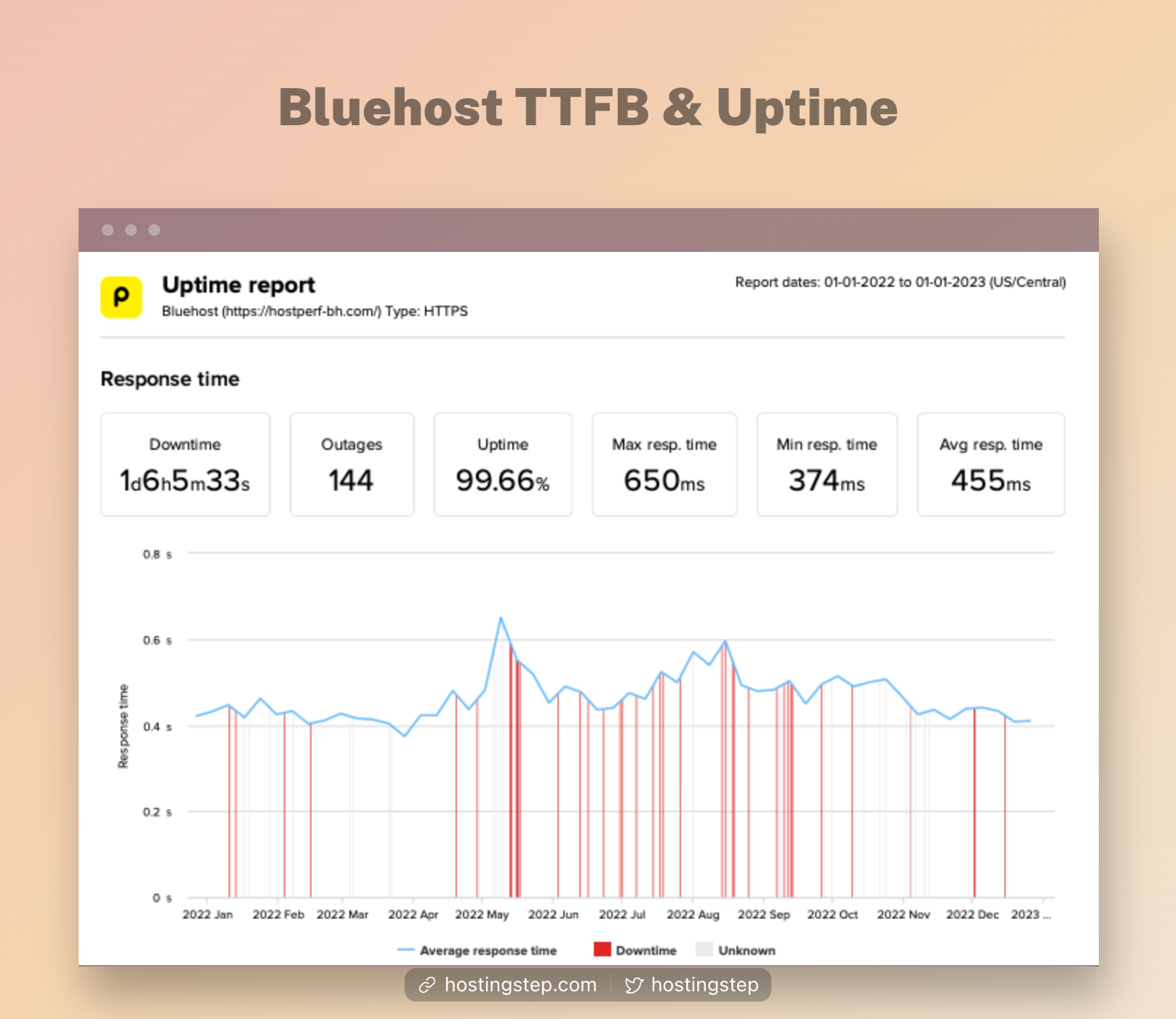
Uptime
Uptime is another extremely important factor, and it’s important to understand that even a great loading speed would be of no use without a reliable uptime. That’s why we need to pay a lot of attention to this factor. I have constantly been testing the uptime of the various hosting services that I usually keep up with.
As per my last uptime test, my ChemiCloud site recorded an uptime of 100% without any outage, while my Bluehost site had an uptime of 99.99% with 1 minute of downtime. Hence, ChemiCloud has better uptime than Bluehost, even though Bluehost’s uptime is also pretty reliable.
Load Testing
Sites can go down because of high traffic sometimes, which is much common in online stores. So, how are you going to deal with that? Well, the answer is to find a hosting service with a good load handling capacity.
I know it’s a completely new word for many of you, but I am here to help you find out the load handling capacity of the two services. I do it by load testing, which I do consistently and religiously to keep up with the load handling ability of the various hosting services that I keep track of. In Load testing, I send concurrent traffic of 1000 clients in 1 minute to the sites and monitor the way they handle it.
As per my last load testing results, my ChemiCloud site recorded 37 ms in Clients Per Test (1000 Clients in 1 Minute) and 43 ms in Maintain Client Load ( 500 Clients in 1 Minute). On the other hand, my Bluehost site recorded 54 ms in Clients Per Test (1000 Clients in 1 Minute) and 374 ms in Maintain Client Load ( 500 Clients in 1 Minute). Hence, ChemiCloud has a better load handling ability than Bluehost.
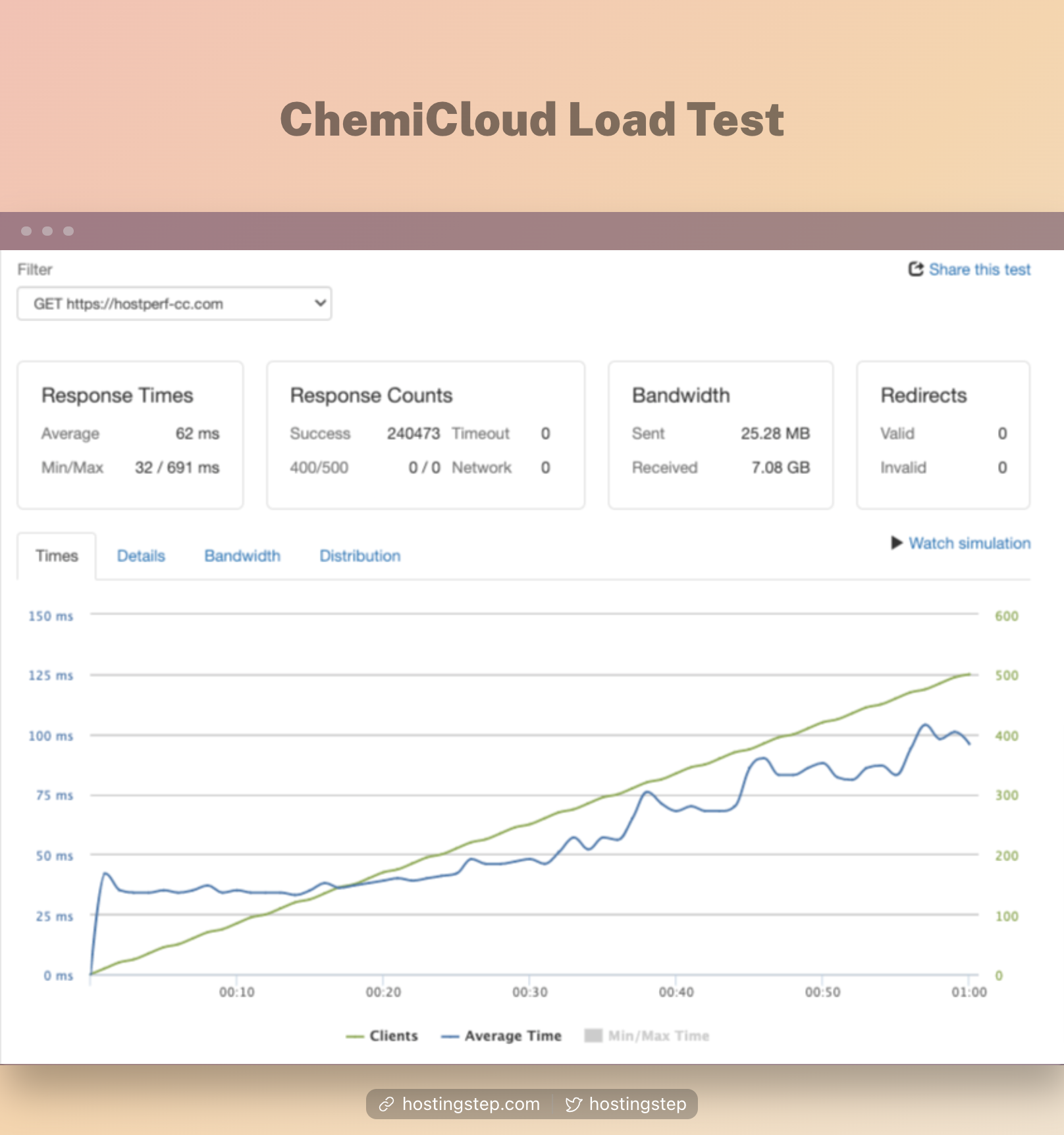
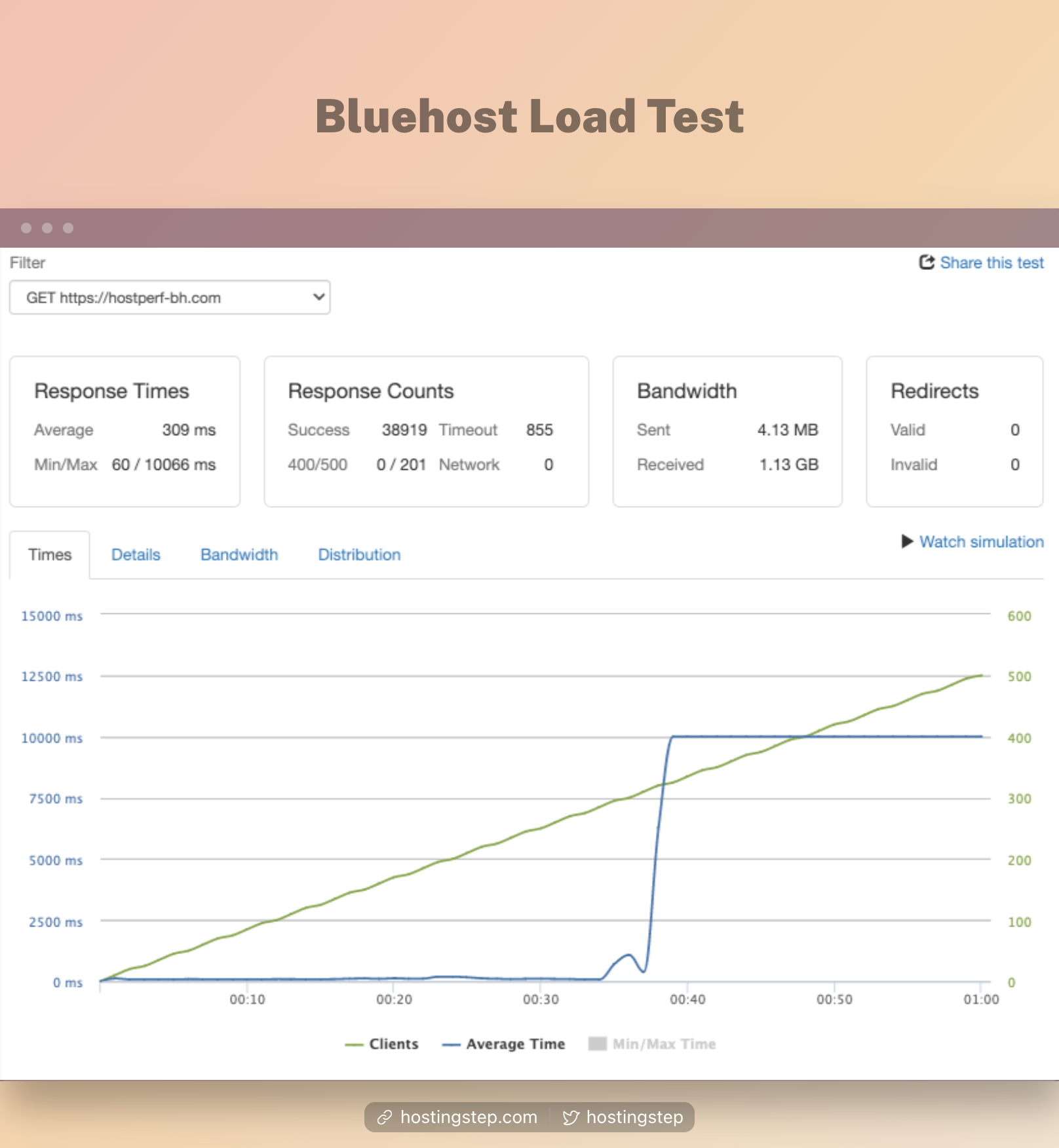
Global TTFB
Another important factor to test is the Global TTFB, and this means the TTFB of hosting services across global locations. It’s important from the perspective of those customers planning to have traffic from multiple global locations for their sites. I check the Global TTFB of various hosting services consistently. The process involves pinging my sites hosted with these services from as many as ten global locations and monitoring their TTFB across the ten locations.
As per my last Global TTFB test, my ChemiCloud site recorded an average TTFB of 406.74 ms, and if we look into the TTFB across the ten places, it has been extremely decent. The site recorded the lowest TTFB in Dallas with 17.16 ms and recorded the highest TTFB in Bangalore with 774.36 ms.
My Bluehost site recorded an average TTFB of 438.82 ms, and if we consider the TTFB across the ten locations, it was pretty decent. The site recorded the lowest TTFB in Dallas with 126.39 ms and recorded the highest TTFB in Bangalore with 781.11 ms. Hence, ChemiCloud has slightly better TTFB than Bluehost, even though you can count on both for their TTFB.


Core Web Vitals
We are just left with one more crucial test for a complete performance test, and it’s called the Core Web Vitals test. This is an important test to determine how much help a site can get from a hosting service in enhancing its user experience. User experience has become an important factor for ranking these days. I have been keeping up the Core Web Vitals for the various hosting services.
According to the last Core Web Vitals test, my ChemiCloud site recorded a ‘Largest Contentful Paint’ of 0.736s, a ‘Total Blocking Time’ of 0.000s, and a ‘Cumulative Layout Shift” of 0. In contrast, my Bluehost site recorded a ‘Largest Contentful Paint’ of 1.080s, a ‘Total Blocking Time’ of 0.020s, and a ‘Cumulative Layout Shift” of 0.002. Hence, it wouldn’t be wrong to say that ChemiCloud has better Core Web Vitals than Bluehost.
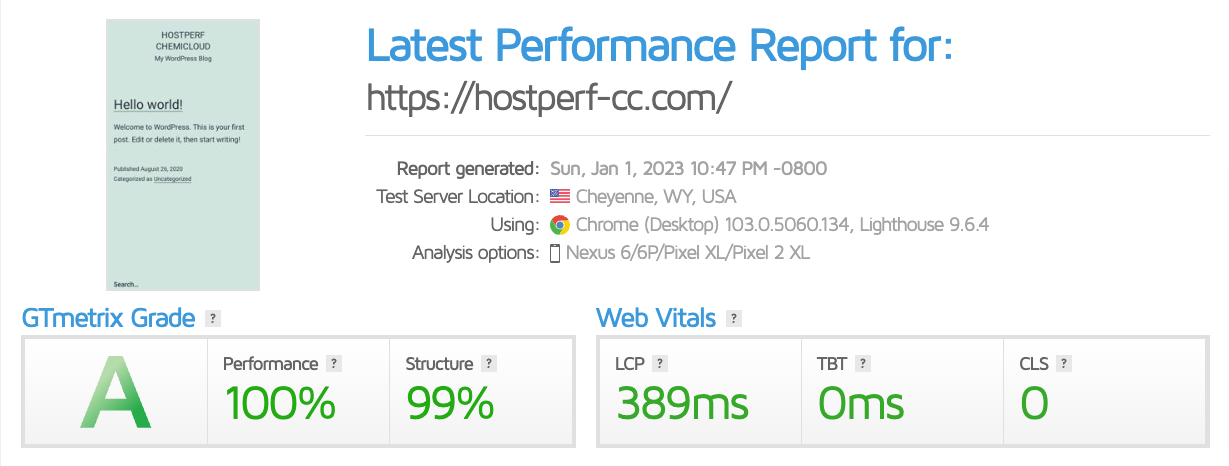
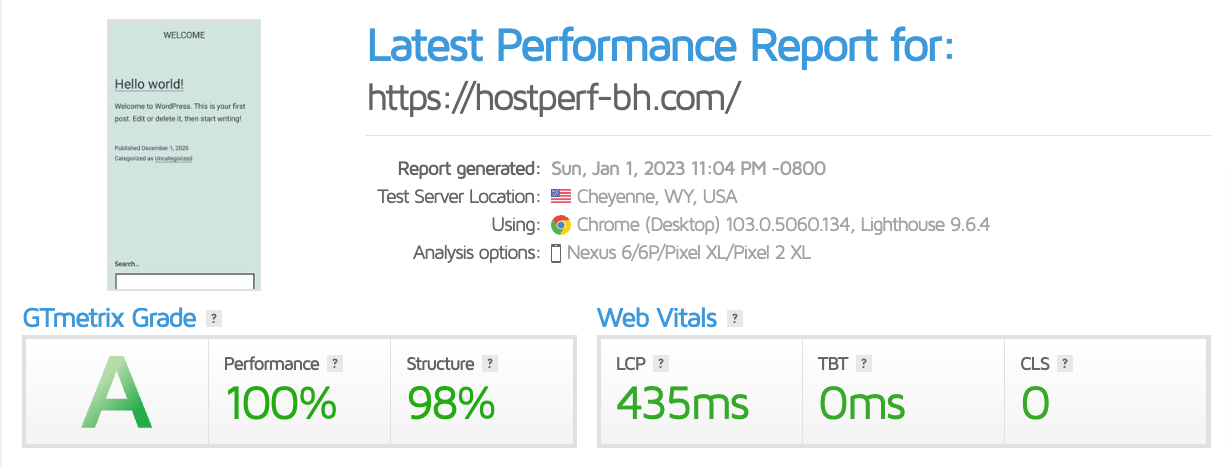
ChemiCloud Vs. Bluehost: Features
Data Center Locations
Datacenter locations play a very important role in hosting, and it is always wise to host a site from the closest server location to the target audience. However, this is only possible if the hosting service you are up to choosing has that location. That’s why you must always ensure that the hosting service you are up to choosing has your desired data center location.
ChemiCloud comes with 7 data center locations across Europe, the USA, and Asia, while customers don’t have much choice with Bluehost since it comes with only one data center location (Utah, USA). This gives ChemiCloud a leading edge over Bluehost.
CDN
CDNs are extremely effective in enhancing the load times, so CDNs are extensively used these days. Both ChemiCloud and Bluehost use Cloudflare CDN and offer it for FREE on all plans. Cloudflare CDN comes with reverse proxy caching, auto minification, image optimization, and gzip compression, reducing bandwidth and CPU usage. This helps sites get blazing fast.
Staging
Staging is an essential feature these days since users don’t go the traditional way of making changes directly to their live sites and instead, they test the changes on a copy of the live site and push the final changes to the live site.
ChemiCloud offers Staging for FREE on all plans, and customers can create staging sites using the Softaculous app installer from their cPanel. The process is pretty simple, and after customers finish testing the changes, they can effortlessly push the changes to their live site in just one click.
Bluehost has a different approach to staging, and the host allows customers to use the staging feature right from the WordPress dashboard. Customers can get to the Bluehost tab in their WordPress dashboard to create a staging site. After they finish testing the various modifications, they can deploy the final changes by choosing between the three deploy options.
If we see comparatively, I think Bluehost has a better and straightforward staging feature than ChemiCloud, and the host offers this feature for FREE on all the plans.
Backup
Before you can host a site, you have to pay a lot of attention to backup, for you may lose your site anytime because of server issues without a proper backup. ChemiCloud has a reliable backup system with FREE automated daily backups available in all the plans. Restoring a copy of the backup is also pretty simple, and customers can easily do it anytime.
However, this is not the case with Bluehost, and even though Bluehost offers FREE automated daily backups with the latest 30 days backups. It doesn’t have the feature on the lowest tier plan. Hence, ChemiCloud has a better backup system in place than Bluehost.
Security
Another aspect that you need to put utmost emphasis on is website security. With the increasing number of online attacks on sites, you need to ensure a robust website security system in place before you can go ahead with hosting a site.
As I closely studied the security features of the two services, ChemiCloud comes with excellent security features such as custom web application firewall rules, real-time 24/7 server monitoring, and HTTPS -encryption with Let’s Encrypt SSL.
However, I wasn’t equally impressed with the Bluehost security features, which comprise resource protection, traffic encryption, automated malware scanning, and expert monitoring. I strongly feel Bluehost’s security system is just a basic security system unless you use Bluehost’s security add-on called SiteLock. Besides, if we look into the track record of Bluehost, the service has been hacked once in the past.
Support
Without a reliable support service, you can get locked away with technical difficulties for just too long. ChemiCloud has a dedicated support team that has done a brilliant job in assisting the customers. The support comprises assistance through 24/7 live chat, tickets, and phone.
Bluehost also has a decent support service in place with knowledgeable executives. The Bluehost support team helps the customers with their technical issues through 24/7 live chat, phone, and tickets alongside a comprehensive knowledge base for a quick reference.
Key Highlights
- ChemiCloud plans come with more resources than Bluehost plans
- ChemiCloud has a better server response time than Bluehost.
- ChemiCloud has a better load handling capacity than Bluehost.
- Bluehost has only 1 server location, while ChemiCloud has 7.
- Both offer FREE Cloudflare and CDN, FREE Staging.
- FREE automated backup feature is missing in the Bluehost lowest tier plan, while ChemiCloud offers it on all plans.
- ChemiCloud comes with a robust security system, while Bluehost’s security system is pretty basic.
Summary: In the end, ChemiCloud offers better value for money than Bluehost. You can get better speed, support, datacenter options with ChemiCloud. Even better, there is ChemiCloud coupon which gives you 60% OFF on the already existing discounts.